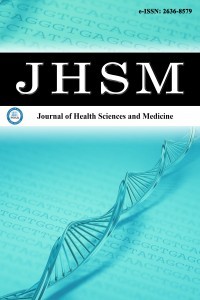Investigation of the CHOKAI score used to predict ureteral stones in patients presenting to the emergency department with renal colic
Aim: To investigate the adequacy of the CHOKAI score in the prediction of ureteral stones in patients presenting to the emergency department with renal colic.
Material and Method: The data of all patients aged over 18 years, who presented to the emergency department with the complaint of renal colic and were diagnosed with ureteral stones during the study period were retrospectively analyzed using the electronic-based hospital information system. The area under the receiver operating characteristic curve and the area under the curve were used to assess for each patient to determine the cut-off value of the CHOKAI score in the prediction of ureteral stones.
Results: The study was completed with 219 patients, of whom 146 were men, and the mean age was 39.4±16.1 years. When the cut-off value of the CHOKAI score was >6, its sensitivity was 84.1%, specificity was 96.7%, positive likelihood ratio was 25.2, negative likelihood ratio was 0.2, positive predictive value was 99.4%, and negative predictive value was 49.2%.
Conclusion: In this study, it was concluded that the CHOKAI score had high accuracy in terms of diagnostic power in detecting ureteral stones. However, further studies are needed to demonstrate the broader applicability of the score.
Keywords:
CHOKAI score diagnosis, emergency medicine, ureter,
___
- Muslumanoglu AY, Binbay M, Yuruk E, et al. Updated epidemiologic study of urolithiasis in Turkey Changing characteristics of urolithiasis. Urol Res 2011; 39: 309-314.
- Khan SR, Pearle MS, Robertson WG, et al. Kidney stones. Nat Rev Dis Primers 2016; 2: 1-23.
- Borghi L, Schianchi T, Meschi T, et al. Comparison of two diets for the prevention of recurrent stones in idiopathic hypercalciuria. NEJM, 2002; 346: 77-84.
- Fontenelle LF, Sarti TD. Kidney stones: treatment and prevention. Am Fam Physcian 2019; 99: 490-6.
- Romero V, Akpinar H, Assimos DG. Kidney stones: a global picture of prevalence, incidence, and associated risk factors. Rew Urol 2010; 12.2-3: e86.
- Ak R, Kurt E, Bahadirli S.. Comparison of 2 risk prediction models specific for COVID-19: the Brescia-COVID respiratory severity scale versus the quick COVID-19 severity index. Disaster Med Public Health Prep 2021; 15: 46-50.
- Erdogan MÖ, Hokenek NM. How to score acute pancreatitis in the emergency setting: five systems against ED-SAS. Signa Vitae 2021; 1: 8.
- Ak R, Hökenek NM. Comparison of AIMS65 and Glasgow Blatchford scores in predicting mortality in patients with upper gastrointestinal bleeding. Rev Assoc Med Bras 2021; 67: 766-770.
- Ak R, Doğanay F, Unal Akoğlu E, et al. Predictive value of scoring systems for the diagnosis of acute appendicitis in emergency department patients: Is there an accurate one?. Hong Kong J Emerg Med 2020; 27: 262-9.
- Fukuhara H, Ichiyanagi O, Midorikawa, et al. Internal validation of a scoring system to evaluate the probability of ureteral stones: the CHOKAI score. Am J Emerg Med 2017; 35: 1859-66.
- Deeks JJ, Altman DG. Diagnostic tests 4: likelihood ratios. BMJ 2004; 329: 168–9.
- Daniels B, Gross CP, Molinaro A, et al. STONE PLUS: evaluation of emergency department patients with suspected renal colic, using a clinical prediction tool combined with point-of-care limited ultrasonography. Ann Emerg Med, 2016; 67: 439-48.
- Elkoushy MA, Andonian S. Lifetime radiation exposure in patients with recurrent nephrolithiasis. Curr Urol Rep 2017; 18: 1-11.
- Fulgham, PF, Assimos DG, Pearle MS, Preminger GM. Clinical effectiveness protocols for imaging in the management of ureteral calculous disease: AUA technology assessment. Urol J 2013; 189: 1203-13.
- Moore CL, Bomann S, Daniels B. Derivation and validation of a clinical prediction rule for uncomplicated ureteral stone—the STONE score: retrospective and prospective observational cohort studies. Bmj 2014; 348: g2191.
- Fukuhara H, Kobayashi T, Takai S. External validation of the CHOKAI score for the prediction of ureteral stones: a multicenter prospective observational study. Am J Emerg Med 2020; 38: 920-4.
- Rohat AK, Kurt E, Şenel Ç. The comparison of two prediction models for ureteral stones: CHOKAI and STONE scores. Am J Emerg Med 2021; 44: 187-91.
- Acar YA, Uysal E. External validation of STONE, modified STONE, and CHOKAI scores for the diagnosis of ureteral stones in the Turkish population. Hong Kong J Emerg Med 2020; 4: 1-7.
- Yayın Aralığı: Yılda 6 Sayı
- Başlangıç: 2018
- Yayıncı: MediHealth Academy Yayıncılık
Sayıdaki Diğer Makaleler
Nilüfer AYGÜN BİLECİK, Sıdıka BÜYÜKVURAL ŞEN, Gülşah YAŞA ÖZTÜRK
Mahmud AYDIN, Serkan SURUCU, Onur OZEL, Onur DEMIRSU, Murat YILMAZ
Hüsnü BAYKAL, Ayşe Füsun ÜLGER
Orhan COŞKUN, Mustafa ÇAPRAZ, Mustafa CİHANGİROĞLU, Ahmet Turan KAYA
Zeynep ÇETİN, Derya KÖSEOĞLU, Özden ÖZDEMİR BAŞER
Işılay KALAN SARI, Serkan CEYLAN
Ahmet KARAYİĞİT, Dursun Burak ÖZDEMİR, Hayrettin DİZEN, Bülent ÜNAL, İlter OZER, Murat ULAŞ
Gizem İLTER AKTAŞ, Tülin FIRAT, Fatma PEHLİVAN KARAKAŞ
Necati ÖRMECİ, Özgün Ömer ASİLLER, Cemil YAĞCI, Tuğrul ÖRMECİ, Zeynep ELLİK, Çağdaş KALKAN, Atilla İLHAN
